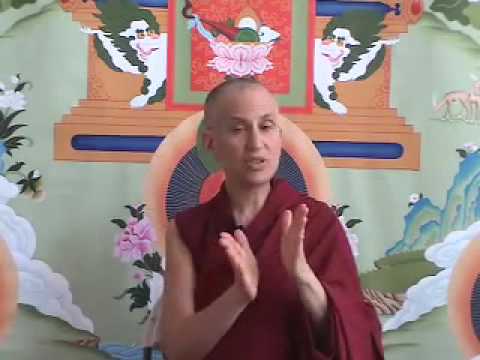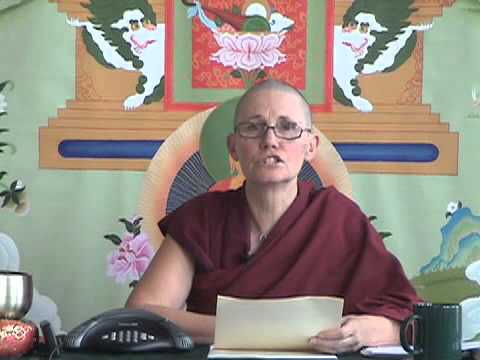Unfortunate rebirths
Stages of the Path #30: Death and impermanence, Part 8
Part of a series of Bodhisattva's Breakfast Corner talks on the Stages of the Path (or lamrim) as described in the Guru Puja text by Panchen Lama I Lobsang Chokyi Gyaltsen.
- How we may filter some teachings through the lens of our previous religious background
- How Buddhist teaching on lower realms differ from theistic religions
- Choosing our actions according to the results we want to have
Yesterday we were talking about how understanding death and impermanence leads to understanding refuge. We also spoke about thinking of the possibility of having an unfortunate rebirth after this life, and that also leads us to take refuge in the Buddha, Dharma, and the Sangha.
While this is not a particularly popular topic in the Dharma—most Westerners prefer to jump over it—I think it is one that we do have to deal with, because the Buddha did teach it.
I think one of the problems Westerners have with this teaching is that if you grew up in a Christian culture, where you’re taught as a little kid if you burp at the table then you did something negative and you’re going to be born in hell… Christianity is very often taught in this very Sunday School childlike way to people. So people, of course, reject that kind of thing when they become adults. (Well, not everybody, but people who think about this kind of stuff often reject it.) But then the imprint’s there from when you were a kid. So then when you hear Buddhist teachings that talk about the hell realms, all of a sudden all of your old Christian conditioning comes and gets put right on top of Buddha’s teachings, and you think that the Buddha is saying the same thing as what you heard in Sunday School and what you rejected later.
In fact, the Buddha is teaching something completely different. What is similar is there is talk of other realms. Buddhism talks of a realms of intense suffering (the hell realms), of intense happiness (the celestial realms, the god realms). But unlike Christianity these things are all impermanent. They’re all temporary. In Christianity they’re eternal. In Buddhism they’re temporary.
In Buddhism they are karmically created. They were not created by somebody else who created those places and then sends you there. These things are created by our own actions.
In addition, unlike in theistic religions, there’s no one who sends us to heaven or sends us to hell. And neither of these is a reward or a punishment. Rather, in Buddhism, our actions create our experience–even in the human realm–so when we experience pain the causes were called negative (or destructive) karma; when we experience happiness the causes were called positive (or constructive) karma. Whatever we experience is a result of our own actions. Nobody else is causing us suffering or happiness. Nobody else judges us after our life and directs our consciousness one place or the other. Any of the six realms of rebirth, none of them are a reward and none of them are a punishment.
This whole way of thinking about an external father figure who gives you rewards and punishments based on rules that are not completely clear to you, this is not the Buddha’s teaching. We have to be very clear about this. And not only intellectually clear, but we have to look in our own minds and see these old habitual, ingrained patterns from when we were kids, and how they surface and how we incorrectly project them onto the Buddhadharma. We have to really see this in our own minds, and when it happens, stop it, because it’s a wrong view. And it’s a wrong view that’s going to cause a lot of suffering.
Rather, it’s much better to really look at, Buddha just taught that things arise due to causes. Who creates the causes? We do! If we want happiness, create the causes of happiness. If we don’t want suffering, don’t create the causes of suffering. It’s up to us.
Of course, one of our problems is we want to create the causes of suffering but have happiness as a result. Because sometimes the causes of suffering bring some kind of rush or good feeling, or you get some kind of worldly benefit from it that feels good. We want to be able to do all those things but still have happiness at the end. That’s like wanting to eat fatty foods your whole life and have low cholesterol. It doesn’t work that way. Or it’s like eating poison and expecting to receive nourishment. It doesn’t work that way. When our cravings contradict the natural law of cause and condition then we have to deal with our cravings. Because our cravings are causing us problems.
And instead, when we see that we’re doing something that isn’t good for us—whether it’s in this life or for future lives—because we cherish ourselves in a positive way, and we respect ourselves and want ourselves to be happy, then let’s not create the causes for future suffering, even if that involves not doing something which seems like a lot of fun right now. Because the fun that you have right now is over very quickly, but the suffering that certain activities entail later on can last for a long time. And we don’t want that.
If we have this kind of view, then it makes sense, because we are voluntarily choosing our actions according to the kind of results we want to have. We’re taking our responsibility and being competent in our lives. This is totally different than running around in fear that you’re going to do something wrong and somebody’s going to come get you.
There are a number of areas in which our prior training gets projected onto Buddhism. This is one of them. So we have to be quite careful about it and notice it and remind ourselves it’s a wrong view.
Venerable Thubten Chodron
Venerable Chodron emphasizes the practical application of Buddha’s teachings in our daily lives and is especially skilled at explaining them in ways easily understood and practiced by Westerners. She is well known for her warm, humorous, and lucid teachings. She was ordained as a Buddhist nun in 1977 by Kyabje Ling Rinpoche in Dharamsala, India, and in 1986 she received bhikshuni (full) ordination in Taiwan. Read her full bio.


